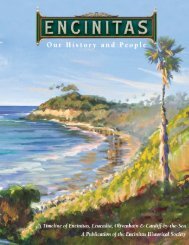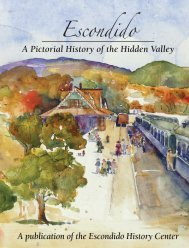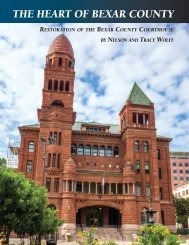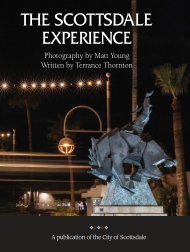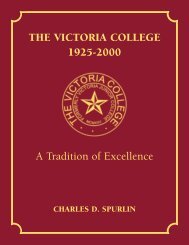Notable New Orleanians: A Tricentennial Tribute
An illustrated history of New Orleans paired with the histories of companies that have helped shape the city.
An illustrated history of New Orleans paired with the histories of companies that have helped shape the city.
Create successful ePaper yourself
Turn your PDF publications into a flip-book with our unique Google optimized e-Paper software.
A. N. Yiannopoulos found “the 1808 Code was a concise statement of principles and rules easily<br />
ascertainable and readily available to all.” 3 In the end Claiborne was more important to Louisiana<br />
than his more well-known contemporaries Jean Laffite or Andrew Jackson.<br />
Louisiana’s Civil Code continued the rational European codification of laws and practice introduced<br />
by the French and Spanish. Its Civil Law system clashed sharply with the English system of<br />
judicial law that has ruled the rest of the United States. In most particulars it was so modern compared<br />
to American private laws that over the years other states have adopted many of its protections<br />
for the family, the widow, and the orphan.<br />
1 See R. Randall Couch, “William Charles Cole Claiborne: An Historiographical Review.” Louisiana History 36 (1995): 453-<br />
465 and Francois-Xavier Martin, The History of Louisiana from the Earliest Period, 2 vols. <strong>New</strong> Orleans, 1827-29.<br />
2 George Dargo, Jefferson’s Louisiana: Politics and the Clash of Legal Traditions (Cambridge: Harvard University Press, 1975), 50.<br />
3 A. N. Yiannopoulos, Louisiana Civil Law System (Baton Rouge: Claitor’s Publishing Division, 1977), 31.<br />
J UDAH<br />
T OURO<br />
(1775-1854)<br />
Judah Touro and John McDonogh (q.v.) were the most important philanthropists of antebellum<br />
<strong>New</strong> Orleans, endowing religious, charitable, and educational causes. Touro and McDonogh also<br />
shared remarkable personal histories. As young men, both participated actively in business, politics<br />
and social life. But both, following their participation<br />
in the Battle of <strong>New</strong> Orleans, gave up everything<br />
but business and virtually ended all personal<br />
relationships. Business dealings seemed to become<br />
their only social outlets. It was almost as if the carnage<br />
of the battle had lifetime effects on them.<br />
The concerns that their wills addressed, Jewish<br />
institutions in one case and public education in<br />
another, were less evident in their lifetimes than<br />
they were after their deaths. During his lifetime<br />
Touro endowed the congregation Dispersed of<br />
Judah, which became Touro Synagogue, and<br />
founded what is now Touro Infirmary. “In later<br />
life,” as Irwin Lachoff has written, “he sought to<br />
return to his Jewish roots, donating generously to<br />
the first Jewish congregations in the city. In the<br />
will that made him famous, he bequeathed over<br />
four hundred thousand dollars to Jewish and<br />
Gentile institutions, both religious and secular.” 1<br />
Earlier, Touro gave far more to explicitly Christian<br />
institutions than to Jewish ones. As to McDonogh, he freed and educated most of his slaves, and<br />
became the single most important factor in <strong>New</strong> Orleans Public Schools, but did not publically support<br />
the public schools movement so crucial to the <strong>New</strong> Orleans American sector following 1840.<br />
Born in <strong>New</strong>port and orphaned as a youth, Touro was brought up by an uncle who eventually<br />
established him in a mercantile business in Boston. In 1801, Touro left for <strong>New</strong> Orleans where he<br />
established a merchant shipping business for his firm. As did McDonogh, he invested in <strong>New</strong> Orleans<br />
real estate, a golden opportunity in the rapidly expanding city. Also like McDonogh in the decade<br />
before the Battle of <strong>New</strong> Orleans Touro was active socially, yet by the Battle he too had remained single.<br />
<br />
Judah Touro.<br />
THE HISTORIC NEW ORLEANS COLLECTION,<br />
1974.25.27.434.<br />
BIOGRAPHIES<br />
27










